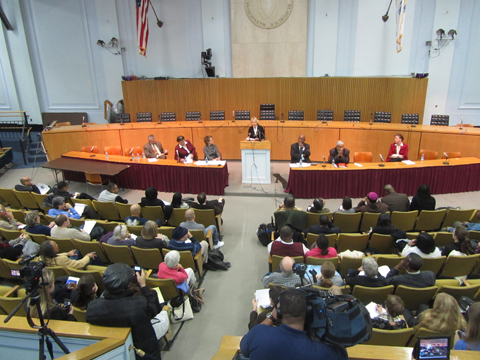
HARDBALL Critical of Governor Patrick's passive approach, opponents of the proposed "three strikes" law aired their grievances at a State House press conference on Tuesday. |
Governor Deval Patrick used part of Monday's State of the Commonwealth address to break his public silence on pending law-enforcement legislation. Though he didn't specifically reference the controversial "three strikes" law — which, if enacted, could incarcerate untold numbers of repeat offenders for life sentences — Patrick said he'll sign a version of the bill so long as it exclusively targets those who commit a "heinous act of violence."
His comments, however, fell on angry, unsatisfied ears. Despite Patrick noting that he'll only sign a crime bill if it also includes progressive measures — like the elimination of mandatory-minimum sentencing for non-violent drug offenders — opponents of "three strikes" believe the governor should drive a harder bargain. Tuesday morning, some of those voices aired their beef at a press conference in the State House auditorium.
"We need you [Patrick] to play a more constructive role in this discussion," said Reverend Eugene Rivers of the Ella J. Baker House. Along with other community and clergy leaders, Rivers addressed a crowd that included few legislators, but more than 100 State House staffers, civil-rights advocates, and activists. "We are asking you to open your doors and meet with resistance leadership from across the state. . . . Governor, we love you — now we need you to do the right thing. And we must confess, that we will hold you accountable for this."
Suddenly "three strikes" is a major news item, thanks to public outcries like Tuesday's press conference. While Rivers promised payback for those who stand "indifferent" on the sidelines, others urged legislators to consider the potential long-term impact of "three strikes" — on spending, on already overcrowded prisons, and on communities.
"It's going to cost us!" said Harvard University School of Law professor Charles Ogletree. "It's the wrong angle, the wrong time, the wrong bill, and we have to stop it right now."
The recent surfacing of "three strikes" legislation in Massachusetts surprised everyone from pols to human-rights crusaders. With states like Mississippi, Texas, and Kentucky abandoning such costly and ineffective sentencing practices, it seemed unlikely that comparably harsh measures would ever come to the commonwealth.
But they did, and now a "three strikes" bill sits in committee after passing both the State House of Representatives and State Senate. Patrick currently awaits a revised version of the bill, the details of which remain a mystery.
To put a human face on crime and punishment at the press conference, Leslie Walker of Prisoners Legal Services introduced Jamie Ayers, a former drug user and criminal who has since earned a college degree and raised five children. Under the proposed bill, Ayers says she likely would have been jailed for far too long to rehabilitate; her claims were backed by facts and figures, offered by former Massachusetts Department of Correction commissioner Kathleen Dennehy, on the pathetic state of prison rehab programs.
Tuesday's media spectacle wasn't unprecedented, nor was it the last call to action. On January 7, more than 300 people showed for a community speak-out at the Dudley Branch Library in Roxbury. This Friday at 5 pm, activists will gather at the Peoples Baptist Church on Tremont Street for a "strategic discussion" on the pending bill. They're not satisfied with the governor's passivity, and, while some welcome the committee process being slowed down, will not sit idle while members of the House remain silent.
"People all over the commonwealth are scared, and that's a fair worry," said Ogletree of concerns about crime. "But this bill is not an answer to that worry."